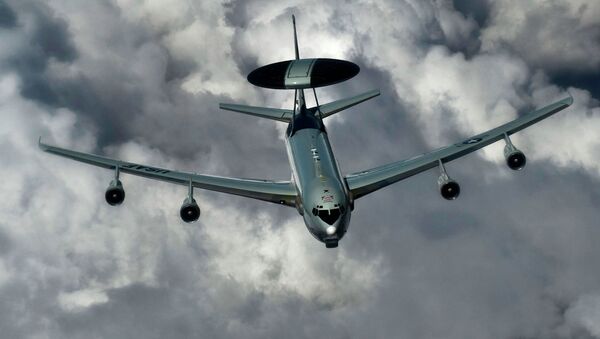It’s a change of cast from the typical news: a US aircraft strayed too close to Chinese airspace on Thursday and got a stern warning from Chinese forces to turn away.
“This is China Naval Air Force on guard, you are approaching Chinese air domain,” the US plane was warned. “Change your course immediately or you will be intercepted.”
Radio amateur captured the audio of #China Naval Air Force warning #US military aircraft off China's #airspace, which is estimated to happen near the coast of mainland China, north of the #TaiwanStrait, July 23. pic.twitter.com/EkhXs9eel9
— SCS Probing Initiative (@SCS_PI) July 23, 2020
The encounter was captured by an amateur radio operator, who recorded the exchange, according to the South China Sea Probing Initiative (SCSPI), a think tank associated with Peking University. SCSPI noted the exchange took place north of the Taiwan Strait, in the East China Sea.
It’s not clear what type of aircraft was warned off, and SCSPI had not returned a request for clarification by Sputnik by the time this story went to publication. However, the US military has been flying spy planes and their refueling aircraft along China’s eastern and southern coasts almost daily for months now. SCSPI, which typically reports on these flights, noted no US aircraft over the East China Sea on Thursday.
However, the think tank noted a “hectic night” in the South China Sea, with two KC-135s over the South China Sea supporting a P-8A Poseidon maritime patrol aircraft and two more in the Philippine Sea supporting B-1B Lancer exercises. SCSPI also noted a P-3C Orion submarine hunter in the South China Sea near Taiwan.
A hectic night of the #SouthChinaSea.
— SCS Probing Initiative (@SCS_PI) July 23, 2020
USAF RC-135W(AE01CD) & US Navy P-8A (AE67D6) just entered the #SCS around 20:00 and 21:00.
With up to 4 KC-135R accompanying, two operated over the #SCS, the other two spotted to the east of Okinawa, probably for the B-1B mission, July 23. pic.twitter.com/Rs07TuQXqq
The day prior, Taiwanese Foreign Minister Joseph Wu noted Chinese aircraft flying near Taiwanese airspace is “virtually a daily occurrence.” Taiwanese aircraft typically intercept their Chinese counterparts and warn them off, much as in the Chinese-US exchange on Thursday. However, China’s actions are always characterized as aggressive.
Late last month, the hawkish Senator Tom Cotton (R-AR) fumed over such incidents near Taiwan as well as Japan, saying Chinese aircraft had “repeatedly invaded the airspace” of Taiwan and “taken aggressive action against Japan, the East China Sea.” The US has postured similarly with regards to Russian aircraft, even while, like near China, US aircraft are often intercepted and warned away as they approach too close to Russian airspace.
Never mind that such flight warnings take place as detected aircraft approach the country’s Air Defense Identification Zone (ADIZ), which extends well off the coast, and were thus perfectly legal, but it stands to reason that if these Chinese actions are aggressive, then so are the American ones.


